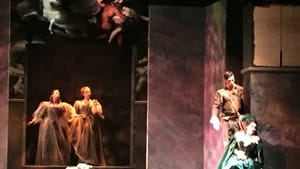Stay in the Loop
BSR publishes on a weekly schedule, with an email newsletter every Wednesday and Thursday morning. There’s no paywall, and subscribing is always free.
A libertine who almost gets away with it
AVA's 'Don Giovanni'

Because the Academy of Vocal Arts is a teaching institution, its choice of repertoire is focused on what will provide the best opportunities for its resident artists. Thus Don Giovanni, this season’s opener, frequently appears on its performing schedule. Mozart’s masterpiece provides eight singers a chance to display their talents — and hone their skills — in a work that’s regularly performed around the world.
This was a propulsive, riveting interpretation. Conductor Christofer Macatsoris maintained tension as Giovanni went from one outrageous adventure to another, and he made sure that the singers didn’t slow the pace by adding self-serving ritards or embellishments that are not in the score. The singers observed the long phrases that Mozart wrote and molded them with expression instead of breaking them with extra breaths for their convenience. The AVA singers were more consistent in quality than those I’ve seen at La Scala and at the Metropolitan in recent years — some of their big names sounded edgy or unsteady, while these young artists had better technical command and were truer to Mozart’s instructions.
Gorgeous, elegant, charismatic
Don Giovanni’s vocal score is evenly distributed among the cast members, seven of whom have their own arias. Vanessa Vasquez’s singing of Donna Anna’s Non mi dir ("Tell me not") was gorgeous, with power, warmth, and shimmering high notes. Jonas Hacker’s Il mio tesoro ("My treasure") was elegant, with an unusual combination of ringing tone and amazingly extended phrases, such as the scale passage just before the return of the main melody’s second chorus. In major opera houses this part has sounded anemic, dry, or choppy compared to Hacker’s lovely rendition.
Anush Avetisyan revealed a major talent as Donna Elvira. In Ah, chi mi dice mai (“Who will ever tell me?”) she augmented her soprano voice with rich mezzo tones. Because this production used Mozart’s original Prague score, Elvira’s second aria, Mi tradi, added six months later for Vienna, was omitted. Its inclusion would have slowed the opera’s momentum, but what a wonderful expression it is of the character’s neurosis and hysteria.
The peasant Zerlina, sometimes cast as a chirpy high soprano, was Allegra De Vita, a solid mezzo who showed strength of purpose. Jorge Espino as Masetto expressed the determination of a proletarian, and André Courville as Leporello humorously listed his boss’s conquests in his “catalog” aria. Daniel Noyola was a charismatic Giovanni, belting out numerous high D-naturals. It’s a curiosity that Mozart gave his title character only two brief arias, a champagne toast and a serenade, but Noyola handled them well. (A parallel cast of AVA residents will alternate during the run’s remaining six performances.)
A demonic appearance
The staging was constricted because of the small size of the room. It should look better when spread out on the wider stages of suburban locations in the next two weeks. Even so, director Jeffrey Marc Buchman provided nice interchanges of balconies and flats to indicate different locales, and he created dramatic images like Leporello joining Masetto and his gang in a hunt for Giovanni, coming downstage and looking into the audience’s eyes.
A coup de théâtre was achieved when Giovanni was about to be dragged to hell by the statue. He faces upstage and moves in that direction to confront his challenger, then wheels around and comes downstage, as if facing us in hell, as a bass voice similar to the statue’s suddenly rings out from the back of the auditorium — a demon, singing “No horror is too dreadful for you.”
What, When, Where
Don Giovanni. Music by Wolfgang Amadeus Mozart, libretto by Lorenzo Da Ponte. Christofer Macatsoris conducted. Jeffrey Marc Buchman directed. Academy of Vocal Arts production through November 12, 2015 at Helen Corning Warden Theater, 1920 Spruce St., Philadelphia; November 14 at Zoellner Center, Lehigh University, Bethlehem, PA; November 17 & 19 at Centennial Hall of the Haverford School in Haverford, PA; November 21 at Central Bucks South High School in Warrington, PA. 215-735-1685 or avaopera.org.
Broadcast on WRTI radio, November 14 at 1pm.
Sign up for our newsletter
All of the week's new articles, all in one place. Sign up for the free weekly BSR newsletters, and don't miss a conversation.
 Steve Cohen
Steve Cohen